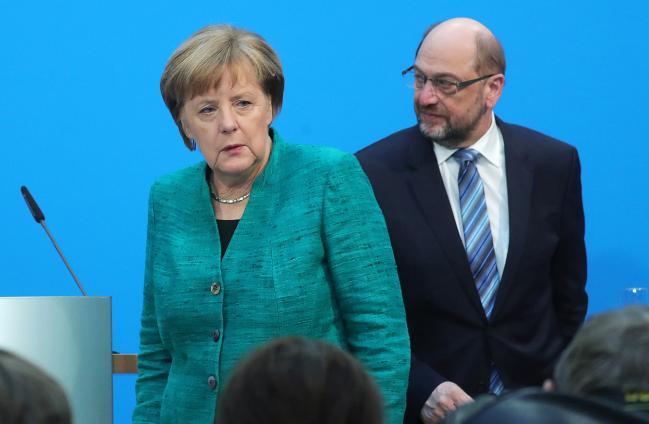(Bloomberg) -- After four months of brinkmanship with her Social Democratic frenemies, Angela Merkel finally has a coalition agreement. But the cost of the deal is high, strengthening the SPD’s hand in pursuing European integration and signaling the German chancellor’s limits as Europe’s de-facto leader.
In a marathon, 24-hour session at the headquarters of Merkel’s Christian Democratic Union alongside a tree-lined canal in central Berlin, the chancellor handed key cabinet posts to the SPD, including the finance ministry her party has held for the last eight years.
Merkel, 63, acknowledged afterward that Wednesday’s endgame to unlock her fourth term required concessions that “weren’t exactly easy.” They were required, though, as prizes for the Social Democrats, whose members now have the final vote on another stint as her junior partner in government.
“The SPD got its wish list,” said Holger Schmieding, chief economist at Berenberg bank in London. “This government will have an even clearer SPD stamp than the former grand coalition did.”
Finance Ministry?
Hamburg Mayor Olaf Scholz, a centrist Social Democrat who’s no darling of the party’s left, is being tipped to run finance, according to German media reports. SPD boss Martin Schulz, who last year led the party to its worst national election result since World War II, looks headed for the Foreign Ministry. They’ll have a platform to fulfill SPD pledges to deepen euro-area cooperation.
Most of the final stretch of talks involved high-stakes bargaining between Merkel and Schulz over cabinet posts, with Social Democratic demands including the finance and foreign ministries, according to a CDU official who asked not to be identified.
The result is a boost for French President Emmanuel Macron’s campaign for a joint budget and a common finance minister for the 19 countries that use the euro. While Merkel has welcomed the idea of deeper integration among EU states to raise the bloc’s global profile, she has been noncommittal about ceding more financial control.
SPD Ballot
For her part, Merkel got a coalition deal after a failed first attempt in November. If it’s approved by SPD members, she can keep governing from the political center with a partner she knows well.
“I think the coalition agreement that we’ve assembled can be exactly this: the basis of a good and stable government that our country needs and that many in the world expect from us,” Merkel told reporters.
A day after a wage deal between employers and IG Metall, Germany’s biggest industrial union, Merkel’s breakthrough toward a new government signals that the country’s consensual system of politics and labor relations still has legs.
The coalition deal must be approved by the SPD’s 463,000 rank-and-file members, many of whom bristle at the prospect of enabling yet another star turn for Merkel in Germany and abroad. Schulz, though, will be able to claim he played a losing hand into a position of strength that belies his party’s decline at the polls.
Merkel will need to rally her base around an agreement that’ll look like a black eye to conservatives in her CDU-led party bloc. While no one is openly challenging her leadership, some in her party voiced dissatisfaction.
‘Awfully Weak’
“Puuuh! At least we’ve still got the chancellery,” Olav Gutting, a CDU lawmaker in the Bundestag, wrote on Twitter.
“This is clearly a coalition treaty of a lineup that is at the end of its political life cycle,” said Jan Techau, a senior fellow at the German Marshall Fund of the U.S. in Berlin. “This looks awfully weak. It’s likely to cost her some credibility.”
Yet predictions about Merkel’s imminent demise may be overblown. Yes, she gave up some key ministries, but she’s an experienced power broker who knows when to give in and when to stand firm. And the SPD held both the finance and foreign ministries during her first-term “grand coalition” from 2005 to 2009.
Merkel is set to stay atop a government whose center of gravity has gradually shifted from cabinet departments to her seventh-floor office at the concrete-and-glass Chancellery in Berlin. Which party runs which ministry isn’t decisive, she said.
“You can only spend the money you have,” Merkel said. “Honestly, I’m not worried at all.”
(Updates with CDU official’s inside account of talks in sixth paragraph.)
